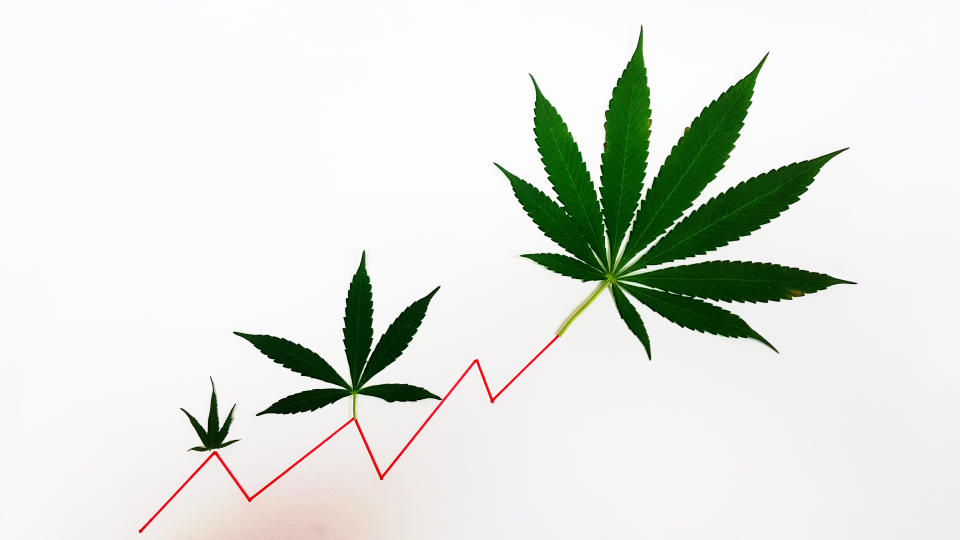Tilray Leapfrogs Aurora Cannabis and Canopy Growth in the U.S. Hemp Market
Tilray (NASDAQ: TLRY) just made it abundantly clear that it takes the opportunity in the U.S. hemp market seriously. The Canadian marijuana producer announced a move to acquire the world's largest hemp food company, Manitoba Harvest, from Compass Group Diversified Holdings for up to 419 million in Canadian dollars, which translates to around US$318 million.
Manitoba Harvest's hemp-based food products are sold in over 16,000 stores in the U.S. and Canada. Investors liked Tilray's decision, with shares of the marijuana producer jumping close to 5% in intraday trading. But Tilray's acquisition of Manitoba Harvest should spur more than a temporary gain.
With its new deal, Tilray appears to be leapfrogging its biggest rivals -- Aurora Cannabis (NYSE: ACB) and Canopy Growth (NYSE: CGC) -- to stake its claim in a potentially huge market.

Image source: Getty Images.
Leading the pack
None of the three of the biggest Canadian marijuana producers have been shy about expressing their desire to enter the United States' market. However, they can't have marijuana operations in the U.S. and retain their listings on major stock exchanges while marijuana remains illegal at the federal level.
Hemp is a different story. By definition hemp is cannabis that contains low levels of the psychoactive ingredient THC, but the U.S. legalized hemp in December 2018. That cleared the way for the major Canadian marijuana producers to jump into the U.S. hemp market.
Canopy Growth was the first to throw its hat in the ring. The company announced in January that it had secured a license to produce and process hemp in New York state. Canopy also plans to spend between $100 million and $150 million to build a large-scale hemp production facility that will anchor a hemp industrial park in New York.
Meanwhile, Aurora Cannabis has been much more cautious. CEO Terry Booth said in the company's recent quarterly conference call that Aurora would "enter when it's proper to enter, and when it's legal to enter into the United States market."
Is Aurora Cannabis behind the eight-ball with the U.S. hemp opportunity? With Canopy's and Tilray's moves, the answer seems to be yes. But Tilray's acquisition of Manitoba Harvest puts it ahead of both of the larger competitors.
Canopy Growth co-CEO Bruce Linton stated last week that his company expects to market hemp-based cannabidiol (CBD) products by the in end of 2019 in U.S. states where they're allowed. Compare that to Tilray's ability to have U.S. hemp products on the market as soon as the Manitoba Harvest deal closes within the next 30 days. While Canopy waits to have products ready for sale in the U.S. and Aurora Cannabis evaluates its options, Tilray will be establishing itself in the market.
How big is the opportunity?
There are different views on how large the U.S. hemp CBD market will really be. The Hemp Business Journal projects that the market will grow to $1.3 billion by 2022, which reflects an impressive compound annual growth rate (CAGR) of more than 27%.
Cannabis market researcher Brightfield Group, on the other hand, is much more optimistic estimating that the U.S. hemp CBD market will soar to $22 billion by 2022. Brightfield Group acknowledges that its forecast is higher than most other projections, but it actually thinks its estimate could be conservative.
Brightfield Group stated that it has "no rose-colored glasses in terms of the bizarre and challenging regulatory framework that surround[s] this industry." However, the research company thinks that "there is too much momentum, too much demand, and too much potential for this industry not to explode."
A smart move
Tilray's acquisition of Manitoba Harvest appears to be a smart move. The deal gives Tilray an immediate position in the North American hemp CBD market, and the structure of the transaction also works to Tilray's advantage. Tilray is funding the acquisition through both cash and stock -- over one-fifth of the purchase price isn't due until six months after the transaction closes.
This acquisition is just the latest example of Tilray's dealmaking prowess. The company's acquisition of Natura Naturals last month boosted its production capacity in a deal that was part cash and part stock with much of the purchase price linked to achieving specified quarterly production milestones over a 12-month period.
Tilray has demonstrated that it is playing to win the overall cannabis market. And with its entrance into the potentially lucrative U.S. hemp market, the company's chances of taking a leading role appear to be greater than ever.
More From The Motley Fool
Keith Speights has no position in any of the stocks mentioned. The Motley Fool has no position in any of the stocks mentioned. The Motley Fool has a disclosure policy.

 Yahoo Finance
Yahoo Finance 